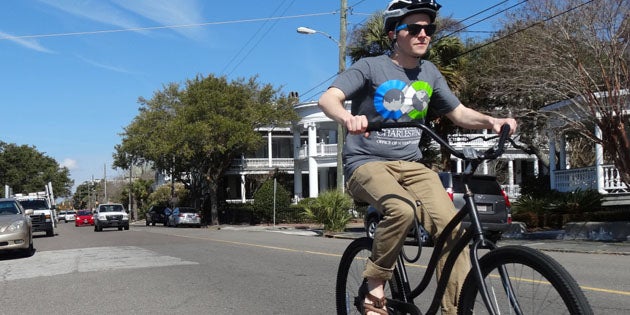Aaron Holly is a passionate cyclist. He’s also a graduate student in the College of Charleston Master of Environmental Studies and Master of Public Administration programs.
The joint program is perfect for his passion – transportation plays a key role in both fields and right now Charleston is the perfect classroom.
“As a cyclist, I am in favor of promoting not only cycling, but also other forms of public transportation,” Holly explains. “With the population in the Charleston area set to grow significantly over the next 25 years, dealing with how we are going to transport ourselves from one place to the other is going to be, if it isn’t already, a serious issue. And for a region that’s already cramped for space, adding more parking spaces and highway lanes isn’t the answer.”
RELATED: Charleston adds new bike parking on King Street.
The City of Charleston recently commissioned Gabe Klein, the former director of transportation systems in Chicago and Washington D.C., to study Charleston’s growing transportation needs for the immediate, near and distant future. His suggestions ranged in scope from bringing back sections of the old Charleston streetcar network (which used to be fairly extensive) to upgrading the city’s parking meters and raising the price of parking to increase revenues for other transportation initiatives.
Regarding biking, Klein mentioned that Charleston is in the ‘awkward adolescent stage.’
“I would definitely have to agree,” Holly says. “There are enough cycling commuters to be noticed, but not enough of a mainstream cycling culture for cyclists to begin policing themselves to start following the rules of the road. Klein spoke of the tensions that exist between different commuters and those who commute by different modes, and in Charleston; there is definitely a tension between drivers and cyclists. But these tensions are often artificial and are indicators of successful changes in transportation mode shares.”
RELATED: Strange as it seems, cycling haters are a sign of cycling success.
Charleston is in the process of adding a bike share program. This summer, city officials heard proposals from three private companies interested in running the program.
Holly has run the College of Charleston’s bike share program since its inception in fall 2013. September 2014 marked the most popular month so far, with more than 300 uses.
RELATED: Bike share is about more than adding bikes to the roads.
Holly hopes to see many of Klein’s recommendations come to pass. He says, “I realize there are barriers to accomplishing these goals, not the least of which is funding. Regardless, the fact that he was doing work in Charleston means that we’re beginning to realize that we don’t like what’s being said, and that we’re changing the conversation.”





